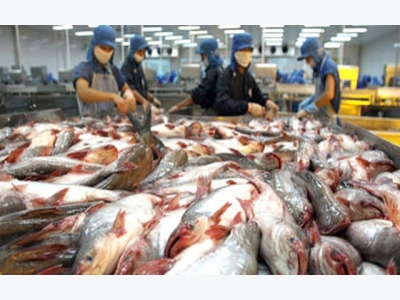Catfish segment seeks to regain market share in the EU

Vietnamese farm raised pangasius catfish sales in the European Union have hit troubled waters in recent months following the airing of a damaging Spanish exposé in early January, say leading seafood distributors.
At a roundtable held late last month on the side-lines of Seafood Expo Global in Brussels, Belgium they sat down to try to come up with a workable strategy to right the sinking ship and get sales back on track.
Leading Dutch consultant Alfons van Duijvenbode led the session, which was also attended by Tran Dinh Luan, deputy head of the Vietnam Directorate of Fisheries and Esther Luiten, director of the Aquaculture Stewardship Council.
There was all around agreement that there was no veracity to the allegations made in the Spanish report, and the focus of the discussion quickly centred on how to cope with the negative perception that it had left in the minds of consumers that sent sales into a downward spiral.
Factually, the fallout has become so bad that it led French based multinational retailer Carrefour, one of the largest supercentres in the globe, to temporarily halt the sale of farm raised catfish from Vietnam.
The move was followed in quick succession by other retail outlets from Belgium to Italy, said the speakers at the roundtable.
The issues that prompted Carrefour to take the action to stop selling product related to perceived overuse of chemicals and other environmental concerns, said Mr. Luan, which though factually untrue have had devastating consequences on sales of product.
Fake news is everywhere today, said Mr. Luan, and it brings the issue of the need for improved public relations by the farmers, processors and exporters in the Vietnamese farm raised catfish segment to the forefront.
Mr Luan noted that sales in the EU marketplace have plummeted by 75% in the early months of this year since the Spanish documentary was broadcast and he doesn’t see the situation turning around anytime soon.
Esther Luiten, director of the Aquaculture Stewardship Council, suggested that Vietnam should apply for ASC certification.
Founded in 2010 the Council is the globe’s leader for establishing standards for responsible farm raised fish and seafood and its certification is globally recognized as a credible and cost efficient way that would add real value to Vietnam farmed catfish.
Attaching the ASC logo to catfish and all Vietnamese aquaculture products would send a strong message to international consumers about the environmental and social integrity of the product they are purchasing, he added.
Leading Dutch consultant Van Duijvenbode agreed with Mr Luan. He said the Vietnamese segment should follow the lead of Alaska, Norway and the Netherlands and obtain independent certification from a reputable organization such as ASC.
Simply refuting the allegations made by the Spanish exposé won’t solve the problem and may just exacerbate it. The problem isn’t whether the allegations are true or false, the problem is that consumers accept the allegations as being true and simply refuting the claims solves little.
The industry in Vietnam on the whole needs to take decisive proactive action and get independently certified by a globally recognized organization such as ASC, said Mr. Duijvenbode.
In addition, the segment must improve its ability to communicate with the world in most importantly— the English language. English is the language of business, and like it or not, Vietnamese must learn to communicate effectively if they are to be competitive in the global marketplace.
Good public relations and marketing is all about communicating in a manner where people focus on the message and not in the way it is relayed. Vietnamese by and large have poor English skills and consequently always come up short on the public relations front, Duijvenbode concluded.
The farm raised catfish segment needs strong spokespersons with excellent English communication skills who can relate to international consumers in a language using terminology and a sentence structure they understand to earn their unbreakable confidence and, in turn, their business.
Otherwise international consumers will continue to believe there is something seriously wrong with Vietnamese catfish.
Có thể bạn quan tâm
 Scotland issues first policy guidelines for seaweed farming
Scotland issues first policy guidelines for seaweed farming The first set of policy guidelines for the commercial cultivation of seaweed in Scotland have been published by the Scottish Government.
 Tra fish price to be more stable
Tra fish price to be more stable After skyrocketing to 10-year highs in April, tra fish price has shown signs of cooling down and is forecast to be more stable in the second half of this year.
 Vietnam seafood companies urged to invest in India
Vietnam seafood companies urged to invest in India Smita Pant, Indian Consul General in HCMC, has called for seafood enterprises in the Mekong Delta province of An Giang to sound out business opportunities